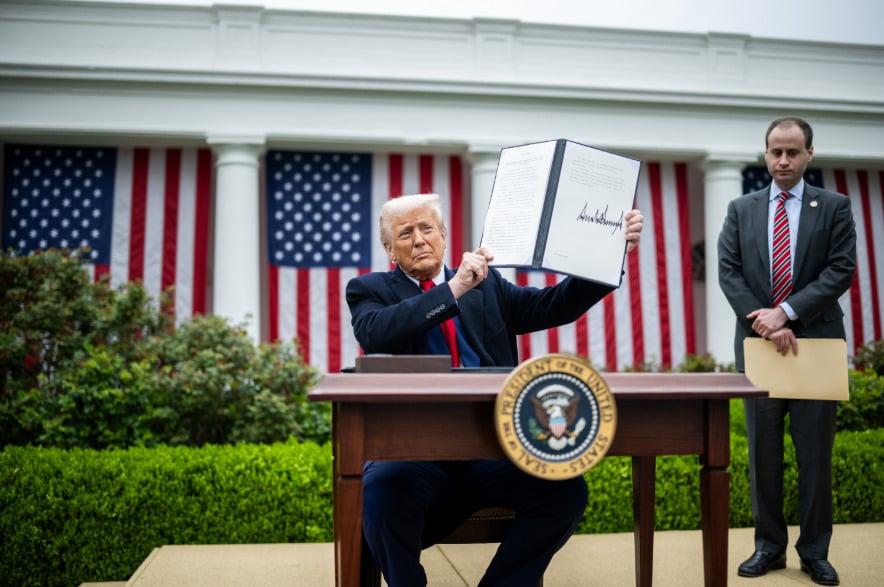Governments around the world are reacting strongly after US President Donald Trump announced a basic tariff of 10% on all imported goods, along with reciprocal tariffs on items deemed to pose high barriers to US goods.

US President Donald Trump at the "Make America Wealthy Again" event in the Rose Garden at the White House on April 2. Photo: White House
China
China on April 3 called on the United States to immediately cancel the new tariffs and said it would take countermeasures to protect its national interests. China’s Ministry of Commerce criticized the Trump administration for ignoring the achievements of multilateral trade negotiations and asserted that the United States has long benefited from international trade.
"China firmly opposes this and will take countermeasures to safeguard its rights," the ministry stressed.
Earlier on April 2, Mr. Trump announced an additional 34% tax on China, in addition to the 20% imposed since the beginning of the year, raising the total tax rate to 54%.
Japan
Japanese Trade Minister Yoji Muto called the tariffs "extremely regrettable" and said Tokyo would ask Washington for an exemption. Japan now faces a 24% reciprocal tariff.
Korea
Acting President Han Duck-soo has ordered emergency support measures for affected businesses, especially the auto industry, after Trump announced a 25 percent tariff on goods from South Korea.
Canada
Prime Minister Mark Carney affirmed that Canada will "respond strongly" with countermeasures.
Goods from Canada and Mexico will remain exempt from reciprocal tariffs, as Trump’s previous 25% fentanyl tariff remains in effect. In addition, 10% tariffs on Canadian energy and potash will remain in place. Products that comply with the United States-Mexico-Canada Trade Agreement (USMCA) will remain tariff-free indefinitely.
Mexico
President Claudia Sheinbaum said Mexico would not respond with tariffs but would instead announce a "comprehensive program" on April 3.
Australia
Prime Minister Anthony Albanese has confirmed that Australia will negotiate with the US to eliminate tariffs without using the dispute resolution mechanism in the free trade agreement between the two countries.
He also rejected the idea of introducing a reciprocal tax, saying it would increase the cost of living in Australia. "We will not engage in a race to the bottom that will lead to higher prices and slower growth," he said.
European Union (EU)
Bernd Lange, chairman of the European Parliament's international trade committee, said the EU would respond with "lawful, legitimate, proportionate and decisive measures". He hoped a strong response from the EU would force the US to the negotiating table.
Irish Trade Minister Simon Harris said the EU would protect its citizens, workers and businesses, while Portuguese Economy Minister Pedros Reis called for a "firm but intelligent" response.
Brazil
The government of Brazil, Latin America's largest economy, said it was considering "all possible actions" to ensure fairness in bilateral trade, including filing a complaint with the World Trade Organization (WTO).
On the same day, the Brazilian Congress passed a bill establishing a legal framework allowing the country to take countermeasures, including tariffs, against unilateral trade actions targeting Brazilian goods and services.
Ngoc Anh (according to Reuters, NBC, WH)
Source: https://www.congluan.vn/the-gioi-day-song-va-phan-ung-truoc-loat-thue-moi-cua-my-post341241.html





![[Photo] Overcoming all difficulties, speeding up construction progress of Hoa Binh Hydropower Plant Expansion Project](https://vstatic.vietnam.vn/vietnam/resource/IMAGE/2025/4/12/bff04b551e98484c84d74c8faa3526e0)
![[Photo] Closing of the 11th Conference of the 13th Central Committee of the Communist Party of Vietnam](https://vstatic.vietnam.vn/vietnam/resource/IMAGE/2025/4/12/114b57fe6e9b4814a5ddfacf6dfe5b7f)















































































Comment (0)